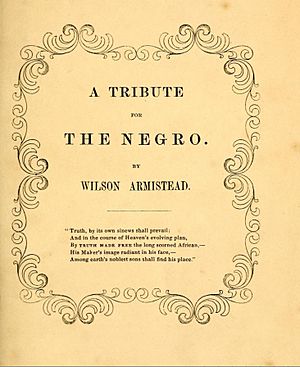A Tribute for the Negro facts for kids
 |
|
| Author | Wilson Armistead |
|---|---|
| Country | United Kingdom |
| Subject | Anti-slavery |
| Genres | Political philosophy |
|
Publication date
|
1848 |
| OCLC | 51815739 |
| LC Class | HT1581 .A6 |
| Text | A Tribute for the Negro at Internet Archive |
A Tribute for the Negro is a book written in 1848 by Wilson Armistead. He was a British activist from Leeds who fought against slavery. The book spoke out against unfair ideas about race, often called "scientific racism," and against slavery itself.
It also included short life stories of important campaigners. These included Henry Highland Garnet and Phillis Wheatley. This book was one of many anti-slavery books published in the 1800s. These books were written by people who wanted to make society better.
Armistead dedicated his book to important Black leaders. These included James W. C. Pennington, Frederick Douglass, and Alexander Crummell. He called them "noble examples of elevated humanity." The main goal of the book was to show the achievements of African Americans. It aimed to prove their abilities and support their cause. Armistead even compared the cruelties of ancient Rome to argue for more modern views on ending slavery.
About the Book
Why This Book Was Important
Historian Herman E. Thomas has highlighted the book's value. He says it helps us understand how people viewed figures like James Pennington. It also provides many positive stories about African American lives.
Different Views on the Book
Not everyone agreed on how helpful the book was. Historian Jasmine Cobb pointed out a problem. She said that even with good intentions, the way African Americans were shown in the book could create wrong ideas about them.
Another critic, Henry Louis Gates Jr., described some of the descriptions as unfair. He said they were like "racist caricatures." This means they were oversimplified and untrue pictures of people. Frederick Douglass himself spoke out against these kinds of depictions.
Julia Sun-Joo Lee noted that writer Charles Dickens also criticized the book in Britain. It's not fully clear if Dickens's reasons were the same as Douglass's. Dickens might have been more focused on how Black abolitionists were sometimes seen as unusual or "exotic" at the time.
 | Sharif Bey |
 | Hale Woodruff |
 | Richmond Barthé |
 | Purvis Young |

